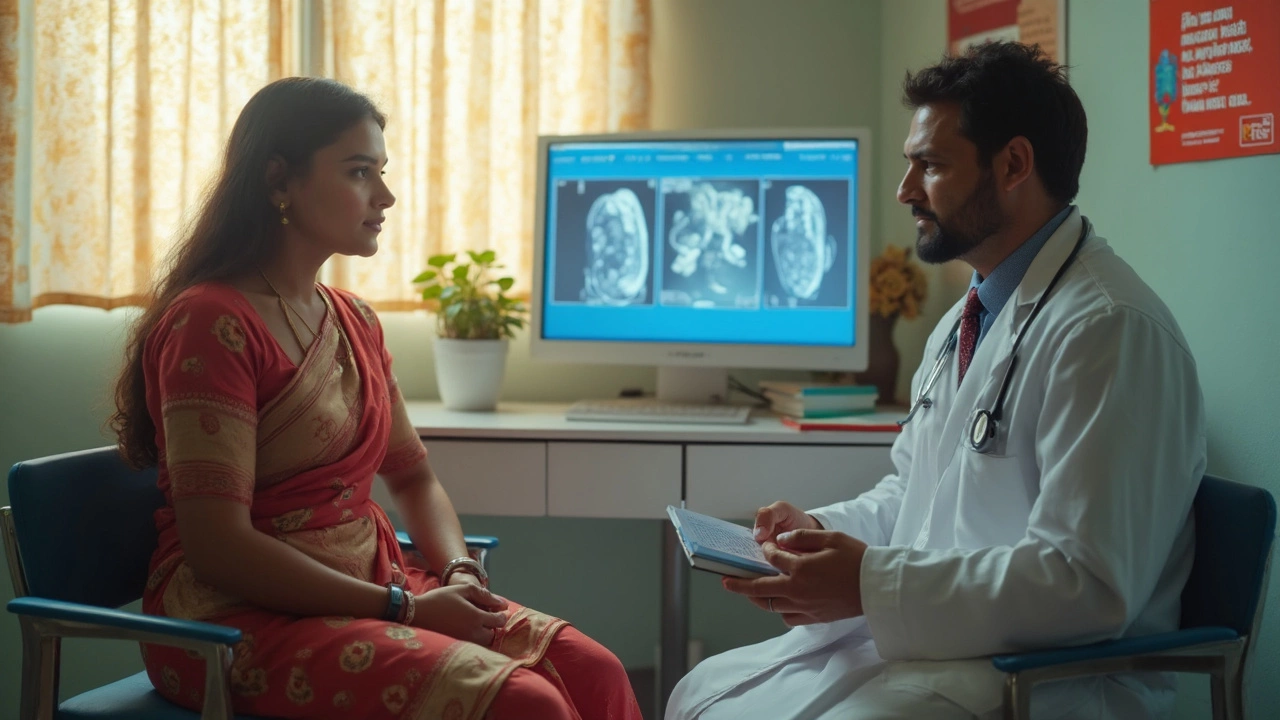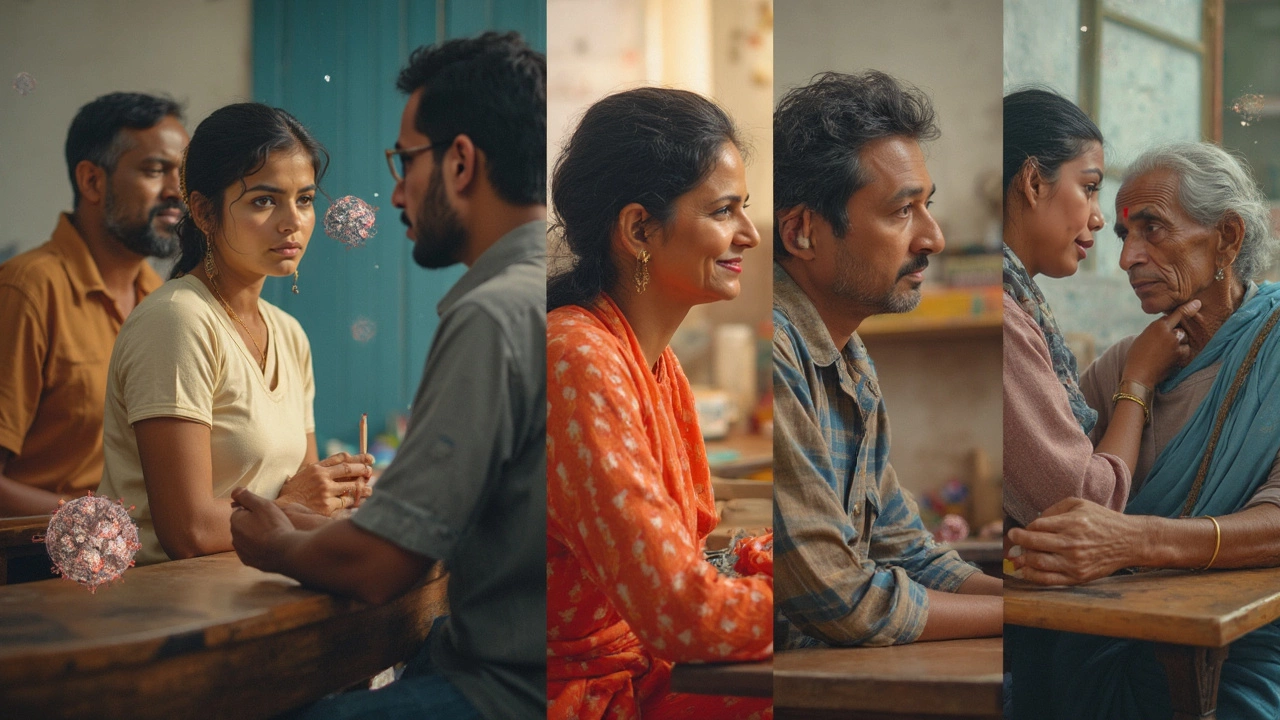Imagine living your daily life, not realizing that something risky is growing inside you. This isn’t rare—plenty of people have cancer for months or even years without a clue. Some cancers are pros at hiding; they can quietly mess with your body while you go about your business, thinking you’re fine.
How long can this go on? It depends on the type of cancer, where it’s hiding, and how fast it grows. For example, prostate cancer and certain types of lymphoma can be sneaky, sometimes sticking around for years before showing obvious troubles. On the other hand, pancreatic cancer can turn deadly fast but might not wave any red flags until it’s pretty advanced.
Missing symptoms doesn’t mean you’re safe. Many folks chalk up early signs—like feeling tired, losing a little weight, or weird pains—to stress or just getting older. The problem is, the longer it flies under the radar, the harder it is to treat when it finally gets noticed. That’s why knowing what to watch for and getting regular check-ups is way more important than most people think.
- The Silent Progression: Why Cancer Can Go Unnoticed
- Common Cancers That Often Fly Under the Radar
- Warning Signs You Shouldn’t Ignore
- When Cancer Finally Shows Up: How People Find Out
- How to Stay Ahead: Screening and Staying Alert
The Silent Progression: Why Cancer Can Go Unnoticed
Most folks think cancer always comes with obvious warning signs, but that’s not true. Some cancers grow super quietly, barely causing a stir until things get serious. Take colon or kidney cancer—these can sometimes go years before causing problems you’d actually notice. That’s partly because your body can quietly adapt to slow changes, and because certain organs don’t easily show pain or symptoms until late in the game.
It’s wild, but up to half of some types of cancer are first found during routine check-ups or because of a scan for something unrelated. Early-stage lung cancer, for instance, rarely makes you cough or feel short of breath. Liver cancer and ovarian cancer also tend to grow under the radar, with symptoms often mistaken for regular fatigue, bloating, or getting older.
Another sneaky part? Cancer’s symptoms get mixed up with everyday stuff. People chalk up unexplained weight loss to dieting, night sweats as hormone changes, or a sore stomach to junk food. And some cancers release tiny amounts of chemicals that mess with your body in small, barely-there ways.
Doctors also point out that some immune systems quietly keep cancer in check for a while, slowing things down before stuff gets out of hand. Plus, tumors don’t always press on nerves or block anything until they’ve grown pretty big. That means you could literally walk around for months, even years, none the wiser.
If you want to stay safe, know that just feeling ‘okay’ isn’t a pass. Regular check-ups and listening to what your body is trying to tell you can catch stuff before it gets ugly. Don’t ignore things that seem ‘not normal,’ even if they’re super mild or come and go.
Common Cancers That Often Fly Under the Radar
It’s easy to assume cancer always comes with big, scary symptoms—but that’s far from the truth. Some types creep along almost unnoticed, and by the time you spot a problem, they’ve often spread. Here’s a look at a few cancers known for keeping a low profile in the early days.
- Prostate cancer: This is the ultimate stealth operator among men. Early on, it might not cause any trouble at all. Later, you might notice going to the bathroom more often or weaker flow, but a lot of guys chalk that up to aging.
- Ovarian cancer: This one’s tricky because the symptoms are so vague—bloating, belly pain, and feeling full after small meals. Plenty of women shrug this off as normal monthly changes or stress.
- Colorectal cancer: Polyps or tumors in the colon can be there for years before you feel anything weird. Maybe a little blood in the toilet or changes in how often you go, but folks often ignore it or blame it on a bad meal.
- Pancreatic cancer: This type doesn’t play fair. People often don’t spot it until it’s pretty advanced, mainly because it stays quiet for a long time or looks like simple stomach issues.
- Liver cancer: Sometimes, early liver cancer gets missed until it shows up on a scan for something else. Most people don’t feel anything until it’s more serious—maybe some pain or swelling, but that’s about it.
Check out some numbers that show just how often these types sneak under the radar:
| Cancer Type | Chance of Early Symptoms | Percent Found After Spreading |
|---|---|---|
| Prostate | Uncommon | ~15% |
| Ovarian | Rare | ~60% |
| Colorectal | Uncommon | ~35% |
| Pancreatic | Rare | ~80% |
| Liver | Rare | ~60% |
So what’s the takeaway? Don’t shrug off changes just because they’re minor or seem random. If something feels off—especially if it sticks around or gets worse—get it checked out. And when your doctor says you’re due for a cancer screening, don’t skip it. Sometimes, these tests are the only clue that something serious is brewing.

Warning Signs You Shouldn’t Ignore
Cancer isn’t always obvious at first, but your body sometimes gives you clues. The thing is, most people shrug these off or think they’re just part of getting older. If you notice something new or weird that sticks around, don’t brush it off. Here’s what should get your attention:
- Unexplained weight loss: Losing 10 pounds or more without trying could be a sign your body’s fighting something serious, like cancer.
- Fatigue that won’t quit: Being tired after a long day is normal. Feeling wiped out for weeks, even after plenty of rest, isn’t.
- Persistent pain: Ongoing pain that doesn’t have a clear reason or isn’t getting better can be a warning sign, especially if it’s in your back, stomach, or chest.
- Changes in bathroom habits: Blood in your pee or poop, trouble peeing, or new bowel habits (like diarrhea or constipation) that don’t get better should be checked out.
- Unusual lumps or swellings: Finding a new lump anywhere—neck, armpit, breast, or elsewhere—always deserves a doctor visit.
- Skin changes: New moles, sores that won’t heal, or patches that look weird can point to skin cancer.
If you feel like your symptoms get blown off at check-ups, keep pushing for answers. Early signs aren’t always dramatic, but they matter.
“About 40% of Americans will be diagnosed with cancer at some point in their lives, but catching it early can make a huge difference,” says Dr. Otis Brawley, former Chief Medical Officer of the American Cancer Society.
Check this out—here’s how some common warning signs show up across different cancers based on real data:
| Warning Sign | Cancers Commonly Linked | Percentage of Cases* Showing This Symptom |
|---|---|---|
| Unexplained weight loss | Lung, stomach, pancreas | ~30% |
| New, persistent pain | Bone, ovarian, pancreatic | ~25% |
| Blood in stool | Colorectal | ~20% |
| Lump under skin | Breast, lymphoma, testicular | ~35% |
*Percentages are averages from studies published by the CDC and Mayo Clinic in recent years.
Bottom line: if something feels off and it sticks around, don’t gamble with your health. Make an appointment and get it checked. Chances are, it’s nothing serious—but if it is, catching it early can actually save your life.
When Cancer Finally Shows Up: How People Find Out
Most people don’t get diagnosed with cancer because they feel something obviously wrong. The truth is, a lot of folks stumble onto it by accident. Maybe they go in for a routine blood test that looks a little off, or they break a bone and the X-ray catches a strange shadow. There are even stories of people finding out because they noticed a small lump while shampooing their hair or by visiting the doctor for a totally different reason—like stubborn heartburn or a nagging cough that just won’t quit.
Some of the most common ways people discover cancer include:
- Undiagnosed cancer sometimes gets picked up during check-ups meant for something else, such as a scan for gallstones that catches an early tumor.
- Accidental bumps or injuries triggering tests, revealing something their doctor wasn’t looking for.
- Unexpected results in routine screenings—like mammograms, pap smears, or colonoscopies.
- Seeing a doctor after symptoms don’t go away (think: coughing up blood, weird bruising, or sudden weight loss).
There’s a big study out of the UK called the National Cancer Diagnosis Audit that tracked how people got diagnosed. It found that about a quarter of cancer cases were first spotted because of symptoms that got worse over time, not sudden pain or drama. The most common tip-offs? Ongoing fatigue, changes in bathroom habits, unexplained weight loss, or lumps that didn’t go away on their own.
Here’s the catch—when cancer is found because of persistent symptoms, it’s more likely to be at a later stage. Early diagnosis, usually by accident or a screening test, gives people a better shot at catching it before it spreads. So if something feels off for more than a few weeks, it’s not rude or dramatic to check in with your doctor. It might just save your life.

How to Stay Ahead: Screening and Staying Alert
You don’t need to turn into a health nut, but keeping up with routine screening really helps you beat silent cancers at their own game. Most people ignore screening until something goes wrong, but some tests can spot problems way before you feel a thing. For example, mammograms can catch breast cancer up to two years before a lump is big enough to be noticed. Colonoscopies and stool tests save lives by finding colon cancer early.
Guidelines might sound boring, but they’re here for a reason. Here’s what most experts agree on:
- If you’re 45 or older, get checked for colon cancer—even if you feel perfectly healthy. Early testing can drop your risk of dying from it by more than 50%.
- Women over 40 should ask their doctor about regular mammograms, especially if there's a family history.
- Men over 50, talk to your doctor about prostate checks. These appointments can pick up cancer when it’s most treatable.
- If you’ve smoked, even if you quit, ask if you need a yearly low-dose CT scan for lung cancer.
It’s annoying, but tracking any weird change really does matter. This means unexplained weight loss, fever, night sweats, lasting sores, or just not feeling yourself for weeks. If your gut says something’s off, don’t ignore it. Doctors say early action means treatments are easier and survival rates are much better.
"Most cancers, when caught early through screening or alert patients, can be treated quickly and effectively. Don’t wait for pain or obvious symptoms—that’s playing defense, not offense."
— Dr. Michael Hurwitz, Yale Cancer Center
Here’s how early detection stacks up with survival rates for the most common types:
| Cancer Type | Five-Year Survival (early) | Five-Year Survival (late) |
|---|---|---|
| Breast | 99% | 32% |
| Colon | 91% | 14% |
| Prostate | 98% | 30% |
| Lung | 65% | 9% |
Bottom line: Don’t hope cancer never happens—get ahead and tip things in your favor. Those fifteen minutes at the clinic are worth years of peace of mind.
